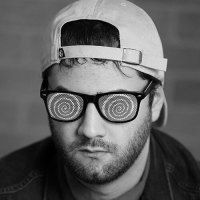2030: How Will Tech Shape Us in the Decade Ahead?
What does the here and now tell us about where we are heading?
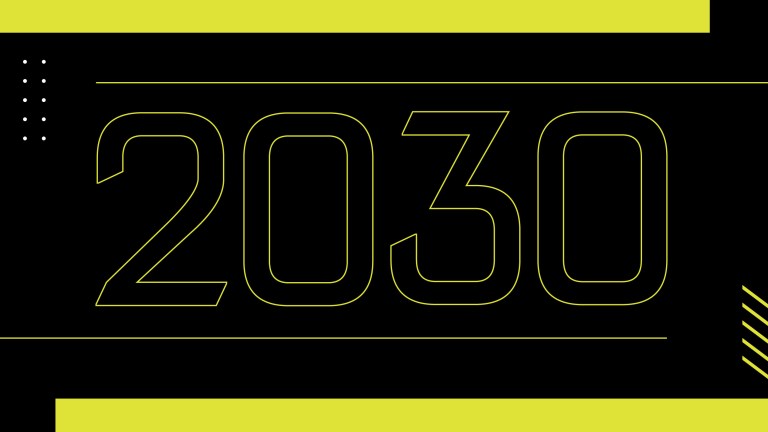
Our relationship to technology has reached a decisive moment. As we start a new decade, we’re thinking more critically about how tech impacts our daily lives than ever before.
The mythmaking behind Silicon Valley wunderkinds has slowed, headlined by a tumultuous few years for Facebook and its founder Mark Zuckerberg, and the smoke-and-mirrors cautionary tale of Elizabeth Holmes and Theranos, among others. Our privacy on a personal and geopolitical scale has been compromised. Consumers are increasingly more uncomfortable with Big Data as an invisible guiding hand in our daily decision-making process. The digital economy has revolutionized whole industries—leading to exciting innovation, yes, but also troubling fallout, as our labor force scurries to find its place in constantly shifting digital sands.
As we move at an unprecedented rate of technological advancement and regulation fails to keep pace, answering the complex questions that continue to arise requires some soul searching: Are we losing ourselves in this process? Is the internet, once conceived as a new virtual plane of community, dehumanizing us and potentially driving us apart for good?
How can we design a roadmap for reclaiming our humanity in harmony with technology, not in spite of it? We asked the people who are plugged into the now to visualize what we may become in 2030.
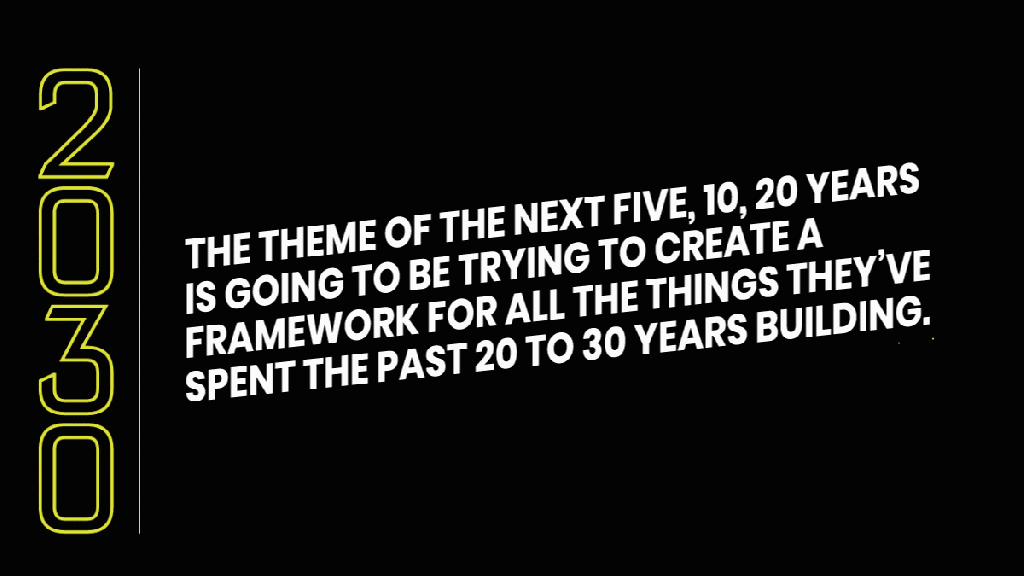
Leveling The Virtual Playing Field
Mike Isaac, a San Francisco-based author and technology reporter for The New York Times, saw the public perception of the tech industry pivot in the aftermath of the 2016 election.
“People started digging into how Facebook was being used to run influence or misinformation campaigns,” Isaac says. “They started looking at how Google was being manipulated. And then I think Uber just became this perfect poster child for the way that tech can be: that technology can exploit [rules] for personal profit.”
In Uber, Issac found a dramatic story that challenged the illusion of the Silicon Valley “unicorn” company. With the book Super Pumped: The Battle for Uber, the culmination of a decade of work on the tech beat, he chronicles the ouster of the once lauded Uber CEO Travis Kalanick, the company’s toxic culture and labor battles, and its unraveling in the months leading up to its historically disappointing IPO in 2019. Once valued at $120 billion, Issac reported in The New York Times that just nine months later, the company was valued at half that number in a “stock market debut that lost more in dollar terms than any other American initial public offering since 1975.” A company once poised to take on the tech giants in Silicon Valley, Uber was exposed as a symptom of a larger cultural problem.
“What we’re seeing is how powerful the forces of tech are in shaping the world,” he says. “Rather than only focusing on how tech is a positive force in the world, people started recognizing the side effects or the negative aspects of it.”
As the company was caught in turmoil, its workers suffered. Falling wages for drivers, protests over working conditions, and the company’s position at the forefront of a debate about the viability of the gig economy became headline news. Issac says that while people are fighting back to keep companies from eroding hard-fought labor rights, the circumstances pose a unique challenge going forward.
“The thing that I think about a lot is how tech, by nature, will always outpace regulation,” Issac says. “You can’t effectively regulate things that don’t exist yet.”
Isaac contends that because enough people are relying on services like ride sharing, a hybrid of the current contractor model could develop in an effort to increase labor protections for part-time employees. One variable could be advancements in self-driving automobile technology, a major point of investment for companies like Uber and Google. Isaac remains skeptical that a breakthrough will occur inside of a decade.
“Who knows how long it’s going to take to regulate a system for those cars to operate in,” Isaac says. He points to Facebook wrestling with political ads or the lack of firm restrictions on consumer-operated drones as examples of regulators being “permanently behind.”
“We’re at a moment where we are actually paying more attention to tech, for better or worse, and are starting to develop frameworks around many of these systems,” he says. “The theme of the next five, 10, 20 years is going to be trying to create a framework for all the things they’ve spent the past 20 to 30 years building.”
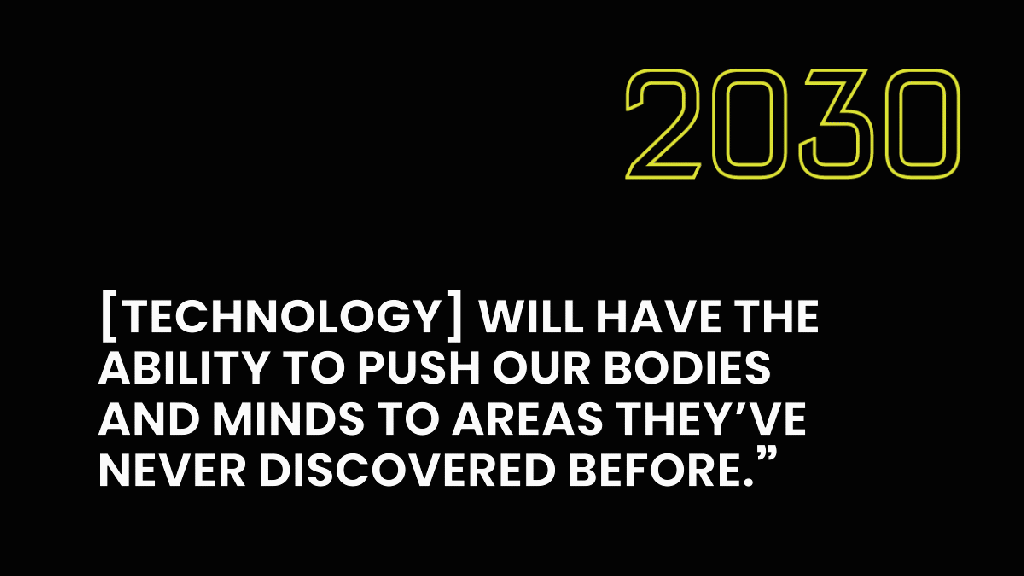
Digital Collective Consciousness
In 2016, Albert Lin was lying in the dirt, crushed under the weight of an off-road vehicle after an untimely accident. When he looked down at his body, he knew he had been transformed. “It was the moment of my death and my rebirth,” he stated during National Geographic’s Storytellers Summit 2019. He lost his right leg that day, and was fitted with a prosthetic limb. Soon after, he began experiencing “phantom pain,” a post-amputation symptom that was once considered a psychological issue. Working with neuroscientists and prosthetists, Lin went to work to remap his brain, and continues to study human bionic capabilities.
A scientist, technologist, and adventurer, Lin has seen firsthand the life affecting miracles of modern science and technology, which he credits for allowing him to be whatever it is he wants to be. He helped start the Valley of the Khans Project, a “technology-enabled” search for the tomb of Genghis Khan, and applied similar methods to searching for the First Emperor’s tomb in China and the Mayan temples of Northern Guatemala—and has been called “The 21st Century Indiana Jones.”
In joining a community of more than 40 million amputees around the world, Lin realized the overwhelming majority—his educated guess is 95 percent—of that group are without prosthetics. His current work is focused on how technology can help transform the lives of millions by creating plastic prosthetics from recycled materials. It’s through his life experience that Lin offered a hopeful look at how tech for good is not just a talking point, but a direct action people are working towards every day. If it’s done right, it could transcend the body.
“Inevitably, innovations in science will have been made especially in regards to cognitive neuroscience,” he says of where we’ll be in 2030. “I believe there will be a unique coupling between science and spirituality.”
Culturally, Lin believes we’re on cusp of a second psychedelic revolution, which he says could have dramatic impacts on both artistic, medical, and technological innovation.
“It will have the ability to push our bodies and minds to areas they’ve never discovered before,” he says.
From a more practical standpoint, he cites food innovation as a necessity if we’re to successfully retool our minds, bodies, and souls.
“Over the past 10 years there has clearly been a revolution in how we think of the food we eat and its role in our well-being,” he says. “I believe and hope that we will see this coupled with a greater understanding of how food is produced and its detrimental impacts on the planet. By allowing ourselves to become better inhabitants of the world we live in, we can lead healthier lives that will have long-lasting effects on our health and bodies.”
Making smarter choices in food production is just one way we can combat what Lin acknowledges is a planet in “crisis.” He predicts that in the next 10 years, we’ll see a “massive human migration” across the planet due to the increased unpredictability of climate patterns and their impact on natural resources. He says this will test our human nature: “We either come together as a planet or fall victim to shortsighted tribalism.”
His outlook is still an optimistic one. As an explorer in the National Geographic community, Lin has devoted his time to traveling around the world to tell untold stories that connect our society.
“With the evolution of our digital collective consciousness and technological advancements, I can only hope that our understanding of societies as interconnected ecosystems, and not individual tribes, will expand and not contract,” Lin says. “I believe in 10 years, our work will give us access to a wealth of information like never before.”
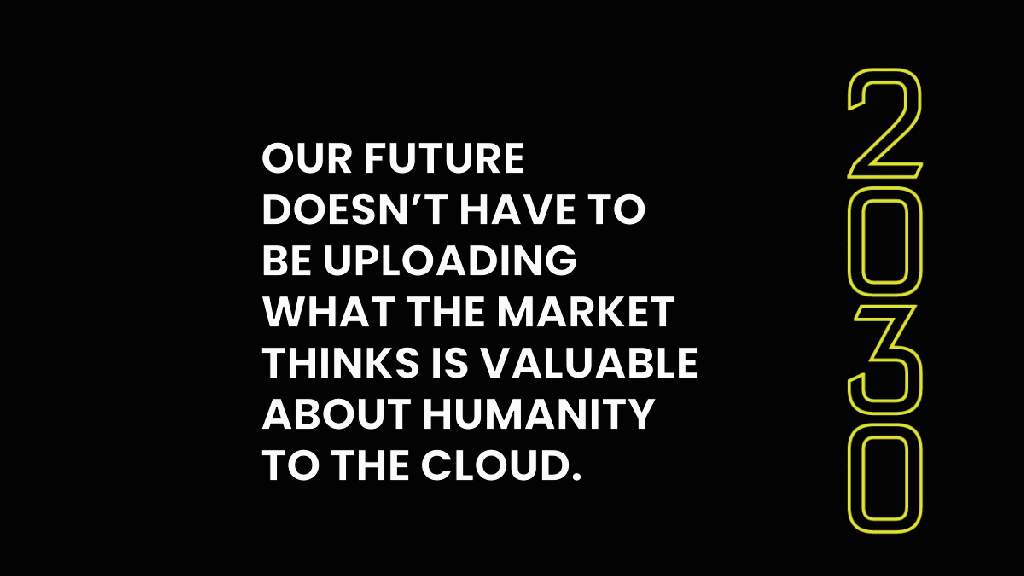
Ending The “Antihuman” Agenda
Douglas Rushkoff—a media theorist, author of over a dozen best-selling novels, and a widely respected thinker and lecturer on the digital age—remembers his agent and publisher asking what was next. He was working on a podcast project called Team Human at the time, and the concept of being human as a “team sport” needed a declaration.
“I thought, ‘Let me just do a manifesto that states our claim,’” he explains. “Our claim as a species to a right to exist. Our future doesn’t have to be uploading what the market thinks is valuable about humanity to the Cloud, but rather realizing that what we have is almost ineffable. That we have an intrinsic worth. If we don’t start from the place that human beings have intrinsic worth, then we will die on the altar of enhancing our utility value.”
Rushkoff noticed a lot of time was being spent talking about tech and various digital media platforms, about what they did to politics or how capitalism has affected the internet. A throughline started to emerge.
“It seemed to me that none of the discussions were engaging with human agency at all,” Rushkoff says.
His previous book, Throwing Rocks at the Google Bus, was a sharp critique of digital capitalism and how companies, fueled by the unsustainable concept of infinite growth, can extract value from our society without giving much back. The responses he saw from the industry were inadequate, “Ted Talk-like” solutions.
“I was really concerned with the passive role that human beings were playing in all this,” he says. “Team Human came out of that, the idea that being human is this team sport. And we’ve got all of these technologies and institutions that are separating us. [The podcast] started as an effort to help people reconnect with one another, to see their intrinsic worth and value as humans, to learn that we’re trying to autotune our society. We’re repressing what I think of as the signal and amplifying the noise.”
Access to big data has drastically transformed our online ecosystems. In some instances, it has poisoned the well: the digital economy has swallowed small businesses whole and the manipulation of social media in the geopolitical and commercial space continues to move us further away from the internet’s communal roots.
Rushkoff writes in Team Human (the book) that this wasn’t a random slide towards “collective incoherence and disempowerment.” There’s a clear reason, he states on the book’s opening pages, for how we got here: “an antihuman agenda embedded in our technology, our markets, and our major cultural institutions, from education and religion to civics and media. It has turned them from forces for human connection and expression into ones of isolation and repression.”
For Rushkoff, regaining our humanity and reasserting human values as our culture becomes more deeply embedded in the digital age will be one of the great challenges of the next decade.
“When I turned digital in the ‘80s, I thought that it would help people see the underlying programs by which we’re living and feel invited to reprogram them, to code them differently,” he says. “And that’s the big question on whether people will feel capable and welcome to reprogram the economy, even doing it locally, town by town, in ways that allow people to create sustainable commerce rather than the trajectory that we’re on.”
A Glass More Than Half Full
The “history of the future”—to borrow a turn of phrase from author Blake J. Harris—has yet to be written. Each decision we make on political, economic, and personal levels will have both intended and unintended consequences that could significantly transform our digital and cultural ecosystems. But before we can look forward, we need a firm grasp on our present.
According to Isaac, the first step is taking back our autonomy and establishing firm lines of communication and transparency.
“The positive change would be people more fully giving their voice to their preference,” Issac says. “Whether that’s control over their own data or control over how companies operate and track or don’t track them. I think the public [should] participate more in the process, and have a say in how they want tech to work and how tech should work for them. That could only be a good thing. When all this stuff is behind closed doors and hidden, and decided without the participation of the public, that’s not a democracy.”
With public opinion rapidly changing, these conversations are, slowly, starting to bridge a digital divide.
“It’s no longer considered a joke for me to talk about human value and how to protect and enhance our humanity in this era,” Rushkoff says of his work on Team Human. “I’m hopeful for the extent to which these ideas are being embraced. Even if people feel a little bit powerless to do anything.”
Whether it’s through public process or on a private level, reclaiming a human connection outside of our screens starts with the people closest to us.
“Broadly speaking, if you asked me to paint a picture of the future I would say it’s a positive one,” Lin says. “But that’s mostly driven by the look I get when I stare into the hopeful eyes of my children.”
Being more present, with family or friends, may require us to break online addictions.
“We keep coming back because we want that hit of connection that’s very available to us,” Rushkoff says. “These technologies are very de-calibrating, and [people are] walking around in this really de-calibrated, de-socialized state.”
Rushkoff wants us to know that we can recalibrate just by sitting with somebody.
“Quickly, five, 10 seconds into it, you’re like, ‘Oh, I’m breathing again. It’s back.’ So the ease with which we can restore so much of that is a positively contagious thing.”
The little black mirror on our phones may look like a window into an ominous future, as punctuated by our troubles with tech in the here and now or decades of ingrained speculative science fiction, but as long as we see ourselves looking back in the reflection, there’s reason to dream about a better tomorrow.
“I would even say the glass is more than half full,” Rushkoff says. “It’s just when there’s a leak, we’ve got to patch that.”
